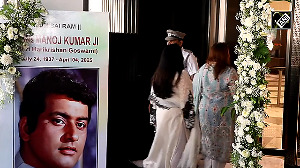India's dusty villages or the green ones keep coming back into the conversations of the well-heeled in India.
Prime Minister Manmohan Singh, while giving the inaugural speech at a leadership summit in New Delhi on Friday, recalled his days as a small boy. "The village did not have electricity or sanitation or potable drinking water, and yet, thanks to the educational opportunities I could move up in life," the prime minister said, as he suggested that he wanted to extend that opportunity to every Indian.
Unfortunately, his government, the United Progressive Alliance which has been in power for the last four and half years, has a dismal record in bringing greater opportunities to people.
The Congress, his own party and the leading party in the ruling-coalition, has ruled India for forty of the sixty years that India has been independent. So, the Congress party cannot shy away from its responsibility about the bulk of the problem that an average Indian faces in their everyday life.
- India in emergency step to unblock trade credit
- India rides out credit crisis but outsourcing industry suffers
Mr Singh or other well-known Indians may emerged from the villages but India's elite , of which he is a part, has mainly focused its energy on and puts its public and private resources in cities.
All the pro-villages rhetoric does is to pay lip service to the people who still live there without electricity and running water. It's been fifty years since Mr Singh left his village to move up the social ladder, while India's poor have only seen their incomes shrink further compared to India's rich and middle classes.
His party leader Sonia Gandhi, also addressing the conference, harped on the point that more needs to be done to alleviate poverty. She wanted India's ambition to be kept in check, pointing out in the same breath, that Indian industry and business should accept more regulations.
Just after Mrs Gandhi's speech, I ran into Arun Maira, a veteran management expert and a consultant to The Boston Consulting Group. His take was that the aspiration for equitable development must be there and is very much a priority area for the country.
But one wonders what will happen to the development goals that independent India set itself and which the Congress party has paid lip service to over the decades.
'Garibi Hatao' (eradicate poverty) of Indira Gandhi, former president of the Congress Party and Prime Minister in the 1970s did not work.
I suspect that the present National Rural Employment Guarantee Scheme will also have meagre results. Possibly, Mrs Gandhi, Mr Singh and other Indian politicians should first start owning up the failures of their governance and that may be a first refreshing step towards development.
It takes the likes of Cherie Blair, wife of former British Prime Minister Tony Blair to point to uncomfortable truths about Indian villages. Addressing the conference, Mrs. Blair talked about her charitable work in India and that brought out the prevalent iniquities.
She opened a school in a village in Punjab, the state where Mr. Singh hails from, earlier in the week. Of the eager children welcoming her, three hundred and fifty were boys, and a meagre forty were girls.
One wonders when will India's ruling elite and its governments take the challenge of universal education across sex, religion, caste and ethnicity seriously enough that Mrs Blair does not need to remind us of our failings.
Mrs. Blair articulated her ambition for India rather well. "I would like to see every Indian woman getting educated and participating in the labour market and thereby adding one per cent of GDP growth to India's already impressive growth rate".
It is the unleashing of such social energies and, not hackneyed government programmes and tiring lip service of politicians, male or female, that will make India's development ambition a reality.






 © 2025
© 2025